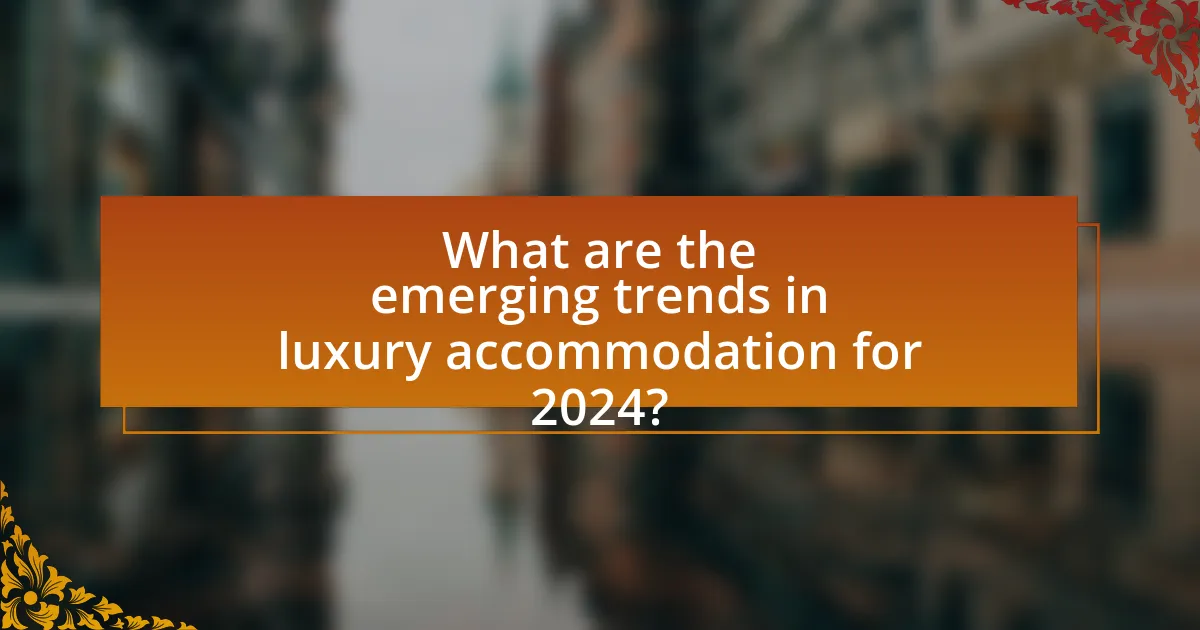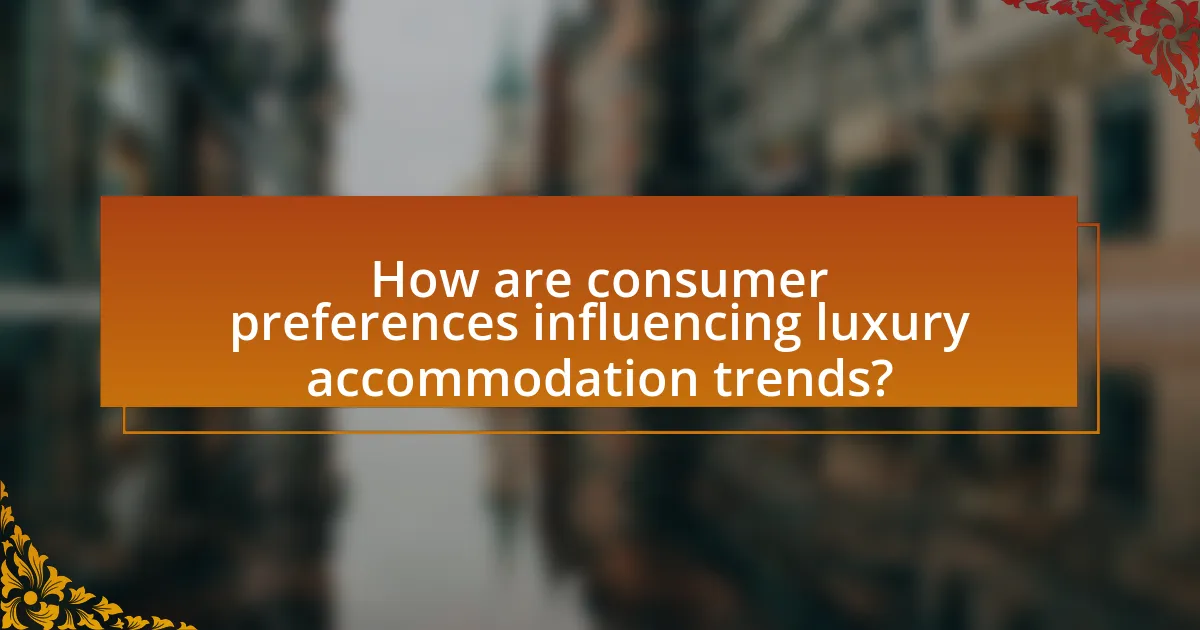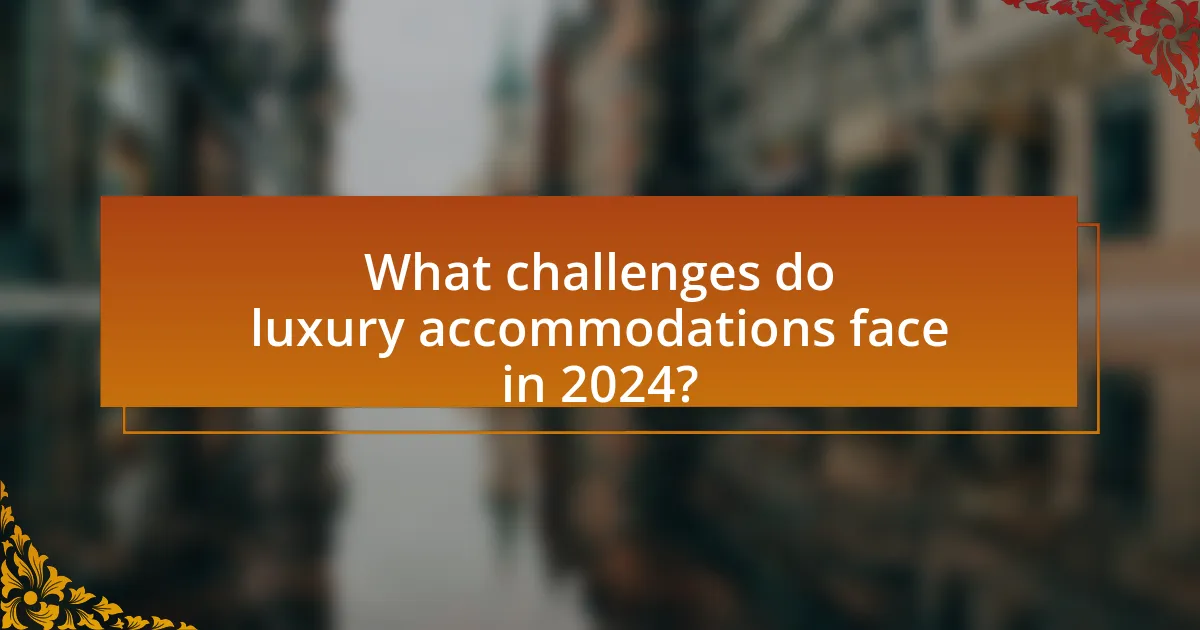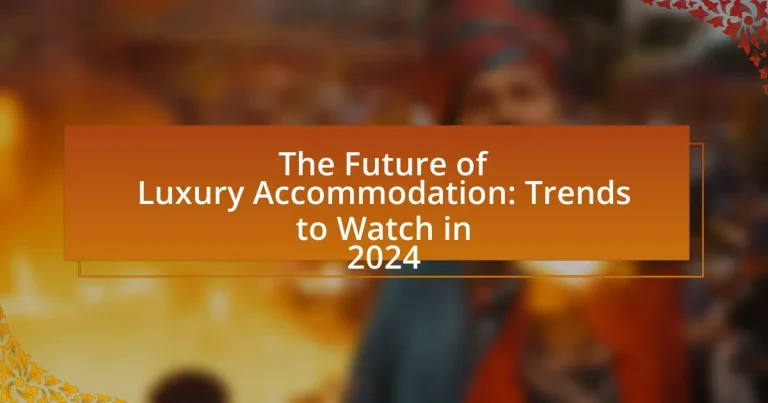The article focuses on the future of luxury accommodation, highlighting key trends for 2024. It emphasizes the growing importance of sustainability, personalized experiences, and advanced technology in luxury hotels. Key topics include the role of artificial intelligence in enhancing guest experiences, the transformation brought by smart rooms, and the essential sustainability practices being adopted. Additionally, it discusses how consumer preferences, particularly among younger travelers, are shaping the luxury travel landscape, along with the challenges faced by luxury accommodations in a competitive market. The article also outlines strategies for hotels to differentiate themselves and retain loyal customers.

What are the emerging trends in luxury accommodation for 2024?
Emerging trends in luxury accommodation for 2024 include a heightened focus on sustainability, personalized experiences, and the integration of advanced technology. Luxury hotels are increasingly adopting eco-friendly practices, such as using renewable energy sources and offering locally sourced food, to appeal to environmentally conscious travelers. Additionally, personalized services, such as bespoke itineraries and tailored wellness programs, are becoming standard as guests seek unique and memorable experiences. The use of technology, including smart room features and AI-driven concierge services, is also on the rise, enhancing guest convenience and satisfaction. These trends reflect the evolving preferences of luxury travelers who prioritize sustainability, individuality, and innovation in their accommodations.
How is technology shaping the future of luxury stays?
Technology is shaping the future of luxury stays by enhancing personalization, streamlining operations, and improving guest experiences. Advanced data analytics allows hotels to tailor services to individual preferences, such as customized room settings and personalized recommendations, which significantly elevate the guest experience. For instance, the use of artificial intelligence in chatbots and virtual concierges provides instant assistance and information, making stays more convenient and enjoyable. Additionally, smart room technologies, including IoT devices, enable guests to control lighting, temperature, and entertainment systems through their smartphones, creating a seamless and luxurious environment. According to a report by McKinsey & Company, the integration of technology in hospitality can increase customer satisfaction by up to 20%, demonstrating its critical role in shaping the future of luxury accommodations.
What role does artificial intelligence play in enhancing guest experiences?
Artificial intelligence significantly enhances guest experiences by personalizing services and streamlining operations. AI technologies, such as chatbots and recommendation systems, analyze guest preferences and behaviors to provide tailored suggestions, improving satisfaction. For instance, a study by McKinsey & Company found that hotels using AI-driven personalization can increase customer satisfaction scores by up to 20%. Additionally, AI optimizes operational efficiency, allowing staff to focus on high-touch interactions, further elevating the guest experience.
How are smart rooms transforming the luxury accommodation landscape?
Smart rooms are revolutionizing the luxury accommodation landscape by integrating advanced technology to enhance guest experiences and operational efficiency. These rooms utilize Internet of Things (IoT) devices, allowing guests to control lighting, temperature, and entertainment systems through voice commands or mobile apps, thereby providing a personalized and seamless stay. According to a report by Statista, the global smart hotel market is projected to reach $1.5 billion by 2025, indicating a significant shift towards tech-driven hospitality. This transformation not only elevates guest satisfaction but also enables hotels to optimize energy consumption and reduce operational costs, making smart rooms a pivotal trend in luxury accommodations.
What sustainability practices are becoming essential in luxury hotels?
Sustainability practices becoming essential in luxury hotels include energy efficiency, waste reduction, and sourcing local, organic products. Luxury hotels are increasingly implementing energy-efficient technologies such as LED lighting and smart thermostats to reduce energy consumption. Additionally, many are adopting waste reduction strategies, including composting and recycling programs, to minimize landfill contributions. Sourcing local and organic products not only supports local economies but also reduces carbon footprints associated with transportation. According to a 2022 report by the Global Sustainable Tourism Council, 70% of luxury travelers prioritize sustainability in their accommodation choices, highlighting the growing demand for these practices.
Why is eco-friendliness a priority for luxury travelers in 2024?
Eco-friendliness is a priority for luxury travelers in 2024 due to a growing awareness of environmental issues and a demand for sustainable practices in the hospitality industry. Research indicates that 72% of luxury travelers are willing to pay more for eco-friendly accommodations, reflecting a shift in consumer values towards sustainability. This trend is driven by the increasing impact of climate change and the desire to minimize carbon footprints while enjoying high-end experiences. Additionally, luxury brands are responding by implementing green initiatives, such as energy-efficient technologies and sustainable sourcing, to attract this environmentally conscious demographic.
How are luxury accommodations implementing sustainable practices?
Luxury accommodations are implementing sustainable practices by integrating eco-friendly technologies, sourcing local and organic materials, and adopting energy-efficient systems. For instance, many high-end hotels are utilizing solar panels and energy-efficient lighting to reduce their carbon footprint. Additionally, they are prioritizing water conservation through low-flow fixtures and recycling programs. A report by the Global Sustainable Tourism Council indicates that 70% of luxury hotels are now incorporating sustainability into their operations, reflecting a growing commitment to environmental responsibility.
What unique experiences are luxury accommodations offering in 2024?
Luxury accommodations in 2024 are offering unique experiences such as personalized wellness retreats, immersive cultural experiences, and exclusive culinary events. These experiences are designed to cater to the growing demand for tailored travel, where guests seek not just luxury but also meaningful engagement with their surroundings. For instance, many high-end hotels are partnering with local artisans and chefs to provide guests with hands-on workshops, allowing them to learn traditional crafts or cooking techniques. Additionally, wellness programs are increasingly incorporating holistic practices, such as guided meditation sessions and bespoke fitness regimens, to enhance guest well-being. This trend reflects a broader shift towards experiential travel, where luxury is defined by the depth of the experience rather than just opulence.
How are personalized services evolving in luxury stays?
Personalized services in luxury stays are evolving through the integration of advanced technology and data analytics to enhance guest experiences. Luxury accommodations are increasingly utilizing artificial intelligence and machine learning to tailor services based on individual preferences, such as personalized room settings, curated dining options, and bespoke activity recommendations. For instance, hotels are implementing customer relationship management systems that analyze past guest behaviors and preferences, allowing for a more customized approach to service delivery. This trend is supported by a report from Deloitte, which highlights that 80% of consumers are more likely to make a purchase when brands offer personalized experiences.
What exclusive amenities are becoming standard in luxury hotels?
Exclusive amenities becoming standard in luxury hotels include personalized concierge services, high-speed internet access, wellness facilities such as spas and fitness centers, and in-room technology like smart home systems. These amenities cater to the evolving expectations of affluent travelers who prioritize convenience, comfort, and personalized experiences. According to a 2023 report by the Global Business Travel Association, 78% of luxury travelers now consider wellness options essential when choosing accommodations, highlighting the growing trend towards health-focused amenities in high-end hotels.

How are consumer preferences influencing luxury accommodation trends?
Consumer preferences are significantly shaping luxury accommodation trends by prioritizing personalized experiences and sustainability. As travelers increasingly seek unique and tailored stays, luxury accommodations are adapting by offering bespoke services, such as customized itineraries and personalized amenities. Additionally, a growing emphasis on environmental responsibility has led luxury hotels to implement sustainable practices, such as eco-friendly materials and energy-efficient operations, aligning with the values of eco-conscious consumers. According to a 2022 report by McKinsey & Company, 70% of luxury travelers consider sustainability an important factor in their accommodation choices, highlighting the direct impact of consumer preferences on industry practices.
What do modern luxury travelers prioritize when choosing accommodations?
Modern luxury travelers prioritize personalized experiences when choosing accommodations. This focus on tailored services includes bespoke itineraries, customized dining options, and unique local experiences that cater to individual preferences. According to a 2023 study by the Luxury Institute, 78% of luxury travelers indicated that personalized service significantly enhances their overall satisfaction with their stay. Additionally, modern luxury travelers seek high-quality amenities, such as wellness facilities and exclusive access to local attractions, which further elevate their experience.
How important is location in the decision-making process for luxury travelers?
Location is critically important in the decision-making process for luxury travelers. Research indicates that 70% of luxury travelers prioritize location when selecting accommodations, as it directly influences their overall experience and access to exclusive attractions. Proximity to cultural landmarks, natural beauty, and high-end shopping districts significantly enhances the appeal of a destination, making it a key factor in their travel choices.
What amenities are most sought after by luxury guests in 2024?
In 2024, luxury guests most seek personalized experiences, high-end wellness facilities, and advanced technology integration in accommodations. Personalized experiences include tailored services such as bespoke itineraries and private concierge services, which enhance guest satisfaction and engagement. High-end wellness facilities, such as state-of-the-art spas and fitness centers, cater to the growing demand for health and wellness among affluent travelers. Additionally, advanced technology integration, including smart room controls and high-speed internet, is essential for providing convenience and connectivity, reflecting the modern luxury guest’s expectations. These trends are supported by industry reports indicating a significant shift towards experiential luxury and wellness-focused travel.
How is the demographic of luxury travelers changing?
The demographic of luxury travelers is shifting towards a younger, more diverse group. Millennials and Gen Z are increasingly prioritizing unique experiences over material possessions, with 72% of millennials preferring to spend money on experiences rather than things, according to a study by Eventbrite. Additionally, there is a growing emphasis on sustainability and social responsibility among luxury travelers, with 70% of affluent travelers indicating that they are more likely to choose brands that demonstrate a commitment to environmental and social issues, as reported by the 2022 Luxury Travel Report by Virtuoso. This change reflects broader societal trends and indicates that luxury travel is becoming more inclusive and experience-driven.
What impact do millennials and Gen Z have on luxury accommodation trends?
Millennials and Gen Z significantly influence luxury accommodation trends by prioritizing unique experiences, sustainability, and technology integration. These generations favor personalized services and immersive stays over traditional luxury, driving hotels to offer bespoke experiences that cater to their preferences. For instance, a 2022 study by Deloitte found that 70% of millennials are willing to pay more for sustainable travel options, prompting luxury accommodations to adopt eco-friendly practices. Additionally, the rise of digital nomadism among these age groups has led to an increased demand for flexible booking options and work-friendly amenities, reshaping the offerings of luxury hotels.
How are family travel needs being addressed in luxury settings?
Luxury accommodations are increasingly addressing family travel needs by offering tailored services and amenities designed for all ages. Many high-end hotels and resorts now provide family suites with multiple bedrooms, kitchen facilities, and child-friendly furnishings to ensure comfort and convenience for families. Additionally, luxury settings often include specialized children’s programs, such as supervised activities, educational workshops, and play areas, allowing parents to relax while their children are engaged in safe, entertaining experiences.
Furthermore, many luxury properties are enhancing their dining options by offering kid-friendly menus and flexible meal times, accommodating the varied tastes and schedules of families. According to a report by the American Hotel and Lodging Educational Institute, 70% of luxury hotels have implemented family-oriented services to attract this demographic, highlighting the growing recognition of families as a significant market segment in the luxury travel industry.

What challenges do luxury accommodations face in 2024?
Luxury accommodations face several challenges in 2024, including rising operational costs, increased competition from alternative lodging options, and evolving consumer expectations. Rising operational costs are driven by inflation and supply chain disruptions, which affect everything from staffing to amenities. Increased competition arises from platforms like Airbnb, which offer unique experiences at lower prices, compelling luxury hotels to differentiate themselves. Additionally, evolving consumer expectations demand personalized services and sustainable practices, pushing luxury accommodations to innovate continuously. These challenges require strategic adaptations to maintain market relevance and customer satisfaction.
How are economic factors affecting luxury travel and accommodation?
Economic factors significantly influence luxury travel and accommodation by affecting consumer spending power and travel demand. For instance, during economic downturns, high inflation rates can lead to reduced disposable income, causing affluent travelers to prioritize value over luxury, thereby impacting occupancy rates in high-end hotels. According to a 2023 report by the World Travel & Tourism Council, luxury travel spending decreased by 15% during the last recession, highlighting the sensitivity of this market segment to economic fluctuations. Additionally, currency exchange rates can affect international travel, as a stronger domestic currency makes foreign luxury destinations more expensive, potentially deterring travel. Thus, economic conditions directly shape the dynamics of luxury travel and accommodation.
What are the implications of inflation on luxury hotel pricing?
Inflation directly increases luxury hotel pricing due to rising operational costs. As inflation rates climb, hotels face higher expenses for utilities, labor, and supplies, which are often passed on to consumers through increased room rates. For instance, the U.S. Bureau of Labor Statistics reported a 5.4% increase in consumer prices in 2021, leading many luxury hotels to adjust their pricing strategies to maintain profit margins. Additionally, luxury hotels may enhance their offerings or services to justify higher prices, further impacting overall pricing structures.
How are luxury accommodations adapting to changing economic conditions?
Luxury accommodations are adapting to changing economic conditions by implementing flexible pricing strategies and enhancing personalized guest experiences. These establishments are increasingly offering dynamic pricing models that adjust rates based on demand fluctuations, ensuring competitiveness during economic downturns. For instance, data from STR shows that luxury hotels have seen a 15% increase in occupancy rates when utilizing such pricing strategies during economic recovery phases. Additionally, luxury accommodations are focusing on bespoke services, such as tailored wellness programs and exclusive local experiences, to attract discerning travelers who prioritize value and unique offerings even in challenging economic climates. This shift not only retains existing clientele but also appeals to new customers seeking memorable experiences, thereby sustaining revenue streams.
What competition do luxury accommodations face from alternative lodging options?
Luxury accommodations face significant competition from alternative lodging options such as vacation rentals, boutique hotels, and serviced apartments. These alternatives often provide unique experiences, personalized services, and competitive pricing, appealing to travelers seeking both comfort and value. For instance, platforms like Airbnb have disrupted traditional hospitality by offering diverse lodging choices that cater to various preferences and budgets, with over 7 million listings worldwide as of 2023. This shift in consumer behavior towards more flexible and experiential stays challenges luxury hotels to innovate and enhance their offerings to retain market share.
How are luxury hotels differentiating themselves from short-term rentals?
Luxury hotels are differentiating themselves from short-term rentals by offering personalized services, exclusive amenities, and a curated guest experience. Unlike short-term rentals, luxury hotels provide dedicated staff, such as concierges and personal butlers, who cater to individual guest needs, ensuring a high level of service that enhances the overall stay. Additionally, luxury hotels often feature unique facilities like fine dining restaurants, spas, and wellness programs that are not typically available in short-term rental properties. According to a 2023 report by the American Hotel and Lodging Association, 75% of travelers prefer the comprehensive services and experiences provided by luxury hotels over the self-service nature of short-term rentals.
What strategies are being employed to retain loyal customers?
Luxury accommodations are employing personalized experiences and loyalty programs to retain loyal customers. Personalized experiences include tailored services, such as customized room settings and exclusive access to amenities, which enhance customer satisfaction and foster emotional connections. Loyalty programs incentivize repeat visits through rewards, discounts, and exclusive offers, effectively increasing customer retention rates. According to a study by Deloitte, 60% of consumers are more likely to stay loyal to brands that offer personalized experiences, highlighting the effectiveness of these strategies in the luxury accommodation sector.
What practical tips can luxury accommodations implement to stay ahead in 2024?
Luxury accommodations can implement personalized guest experiences to stay ahead in 2024. By leveraging data analytics, hotels can tailor services and amenities to individual preferences, enhancing guest satisfaction and loyalty. For instance, a study by Deloitte found that 80% of consumers are more likely to make a purchase when brands offer personalized experiences. Additionally, integrating sustainable practices, such as eco-friendly amenities and energy-efficient systems, can attract environmentally conscious travelers, as 70% of luxury travelers prioritize sustainability in their choices, according to a report by Booking.com. Finally, investing in advanced technology, like AI-driven concierge services and seamless mobile check-ins, can streamline operations and improve guest interactions, aligning with the growing demand for convenience in the hospitality sector.
How can luxury hotels enhance their marketing strategies to attract guests?
Luxury hotels can enhance their marketing strategies to attract guests by leveraging personalized experiences and targeted digital marketing. Personalized experiences, such as tailored packages and bespoke services, create a unique value proposition that resonates with high-end travelers. For instance, a study by Deloitte found that 80% of consumers are more likely to make a purchase when brands offer personalized experiences. Additionally, targeted digital marketing through social media platforms and search engine optimization can effectively reach affluent demographics, as 70% of luxury travelers use social media to research their trips. By combining these strategies, luxury hotels can significantly increase their appeal and attract more guests.
What best practices should luxury accommodations adopt for exceptional service?
Luxury accommodations should adopt personalized service, attention to detail, and proactive guest engagement as best practices for exceptional service. Personalized service involves tailoring experiences to individual guest preferences, which can enhance satisfaction and loyalty. Attention to detail ensures that every aspect of the guest experience, from room amenities to dining options, meets high standards of quality. Proactive guest engagement, such as anticipating needs and offering assistance before being asked, fosters a welcoming atmosphere and builds strong relationships. These practices are supported by industry research indicating that personalized experiences can increase customer satisfaction by up to 20%, highlighting their importance in luxury hospitality.


